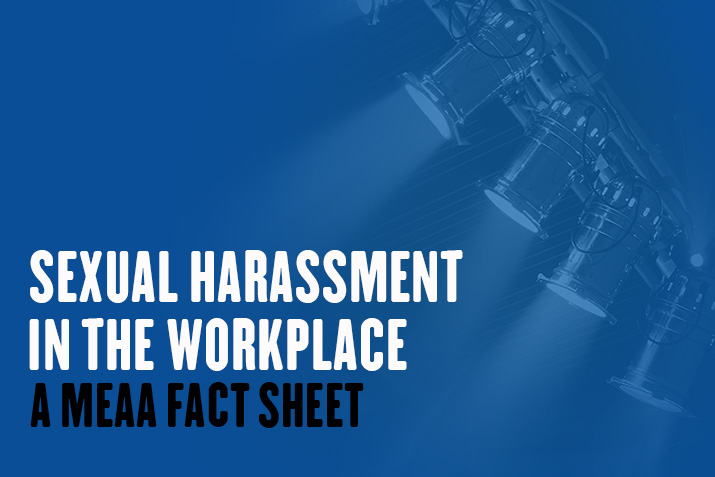Sexual Harassment in the Workplace

MEAA has prepared this fact sheet to help members understand their rights and how to get help.
What is sexual harassment?
Sexual harassment is any unwelcome conduct of a sexual nature. If a reasonable person would anticipate that the behaviour might make you feel offended, humiliated, or intimidated, it may be sexual harassment.
You have a right to say “NO” to sexual harassment and remove yourself from any situation where you feel unsafe.
Sexual harassment is illegal under the Commonwealth Sex Discrimination Act 1984. All employers, regardless of their size, have a legal duty to take all reasonable steps to prevent sexual harassment in the workplace.
Types of sexual harassment include:
• Sexually suggestive or offensive comments, insults, or jokes or imagery.
• Intrusive questions or comments about your private life or physical appearance.
• Requests for sex or sexual activities.
• Inappropriate staring or leering.
• Unwelcome touching or physical contact.
• Sexually explicit or harassing messages (including text or social media), phone calls, emails, or images.
Sexual harassment doesn’t have to be ongoing. A single incident can constitute sexual harassment.
Some instances of sexual harassment can also be criminal offences, including physical or sexual assault. These offences should be reported to the police.
Where does workplace sexual harassment take place?
Sexual harassment can happen at work, at work-related events or trips (including social events such as awards shows or while on tour), between people sharing a workplace and between colleagues outside of work.
Who is covered by workplace sexual harassment laws?
It is illegal to sexually harass current or prospective employees, contract workers, colleagues, or any other workplace participant. An ‘employee’ includes full-time, part-time, and casual employees.
Sexual harassment can be perpetrated by anyone that an employee comes into contact with in the course of their employment, for example audience members or site visitors.
Any person, regardless of age, gender, sexual orientation, or race, can be the victim or perpetrator of sexual harassment.
Illegal sexual harassment can also happen in educational institutions and inter-school activities.
Employer responsibilities
Your employer has a responsibility to ensure you are safe at work. This includes making sure your work life is free from harassment and bullying. Your employer should make it clear that sexual harassment in any form is unacceptable in the workplace. This can be done by:
1. Developing and implementing a clear sexual harassment policy and procedure for dealing with complaints. A complaints procedure should include details of:
• Who you should make a complaint to.
• Options for pursuing a complaint (eg formal or informal).
• The process for each option.
2. Notifying all employees at the start of their employment that sexual harassment will not be tolerated and providing them with information about, and access to, the sexual harassment policy and procedures.
What should happen when you make a complaint of sexual harassment?
If you experience or witness sexual harassment at work, you have a right to speak up and, if appropriate, to make a formal complaint.
Who you report an incident of sexual harassment to may differ on each production. It could be a dedicated HR person, stage manager, head of department or producer.
You should make a time to talk to that person privately and you have the right to bring a person for support if you need one.
If you decide to make a complaint then you should expect the following to happen:
• Your employer should take your complaint seriously.
• Your employer should document your complaint regardless of whether a formal investigation is conducted or the results of any investigation.
• Your employer should discuss with you the steps to be taken to ensure your safety.
• Your complaint should be addressed in a fair, timely, and confidential manner. If a serious crime has occurred the employer will be obliged to report it to the police.
• Your employer should give you information about what complaints procedures are available to you, such as formal and informal processes.
• Your employer should follow the complaints procedure you elect, and you should be allowed to have a support person with you throughout the process.
• Only you, and those people who need to know in order for the complaint to be properly and fairly investigated, should be provided information about your complaint.
• In the case of a formal complaint, the person you have made the complaint against should be notified and given an opportunity to respond.
• If a person is found to have sexually harassed you there should be clear consequences for their actions.
• You should not be disadvantaged. By law you are protected from being adversely affected as a result of making a complaint of sexual harassment.
WHERE TO GET HELP
MEAA can give you advice and representation on dealing with sexual harassment. MEAA recommends that assault or other criminal offences should be reported directly to the police in your state.
For more information, contact MEAA Member Central on 1300 656 513.